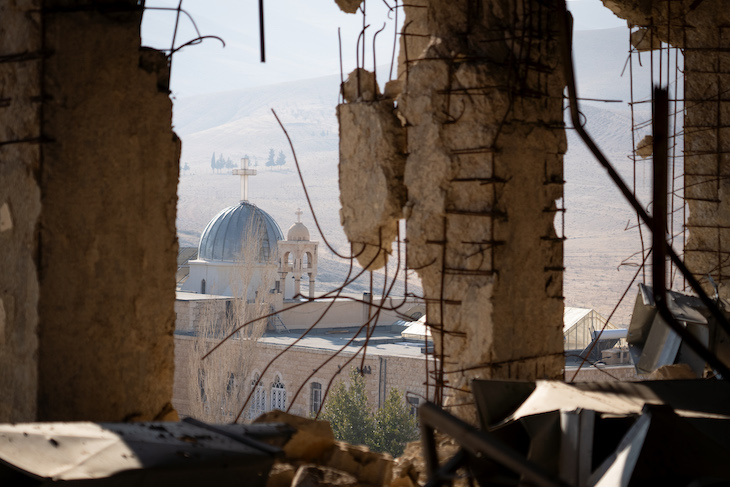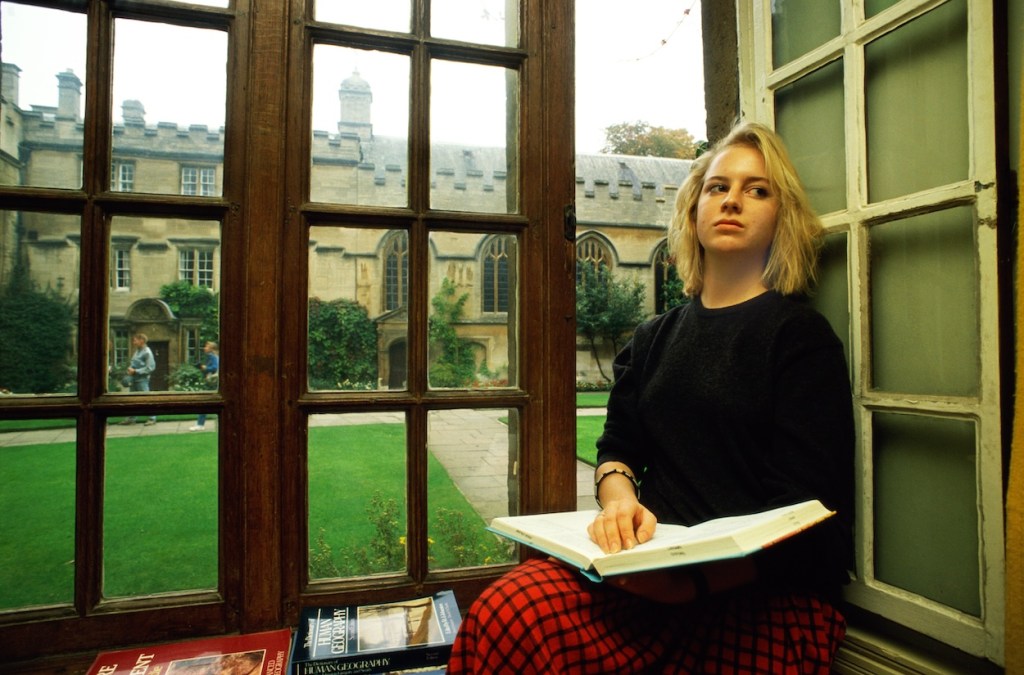On a street corner in the old town of Damascus, rugged men with rifles stare sharply at passers-by. Despite their appearance, the long beards and scruffy improvised military fatigues, they are not the militiamen of the Hayat Tahrir al-Sham (HTS), but local Christian volunteers protecting the neighbourhood. When Bashar al-Assad fell and Islamist rebels took over, some of the Christians in the country feared the worst. Though atrocities have and do still happen, the bloodbath many feared never took place.
“There was a feeling that the regime may protect us from fanatics,” explains Father Jihad, the head monk
The police station nearby was ransacked by angry locals on the night Assad fled the country. The police force was disbanded by HTS when they took over, and now their fighters are awkwardly trying to fill in their roles. Outside the building, an old lady, Maria Farouj, is sitting next to the trashed police cars patiently waiting for her turn.
She is there to make a complaint about thugs in her neighbourhood trying to push her out of her flat and sexually harassing her daughter. “The former police were just the pimps of Assad!” Maria exclaims excitedly. “I lost my trust in the priests, too. I’m a Christian, but I’m not afraid of HTS. They are the sons of freedom. I have high hopes for them.”
Not everyone is so optimistic about the new government. “There have been too many incidents to call it coincidence or an exception,” explains a Greek Orthodox girl in a bar. “We reported all the violations to HTS. They said these were isolated individual incidents. But there were too many; I think it is systemic.” A man (and fellow Christian) sitting at the next table challenges her: “Were you this upset when Assad bombed mosques? Look, you wear a golden cross and no headscarf, you go to bars and drink. Has anyone harassed you?”
Maaloula is a small town a short ride away to the north from Damascus. It is one of the last places where locals speak Aramaic, the language of Jesus and the Apostles. At the beginning of the civil war, the town was besieged by the Islamists of the al-Nusra Front, the predecessor organisation of HTS and the official wing of al-Qaeda in Syria at the time. Churches were desecrated, civilians kidnapped and executed. The regime forces bombarded the city and retook it several months later.
HTS has since cut ties with al-Qaeda and now promises protection to all segments of the Syrian society, including Christians. Yet some of the militants who rampaged through Maaloula a decade ago might be sitting in government positions or will be officers in the new army. This also explains the locals’ fear of talking about them openly.
“They looted and burned down my store and warehouse,” says Sarkis, who runs a small shop. “But they seem to have changed. Apart from some theft, no atrocities have happened since HTS came to power. Now they need to hold elections, as they promised, and hand power over to whoever the people elect.”
Members of the government and those close to them in Damascus do appear sincere in their intentions to hold elections in four years. But in casual conversations, they also confess that they have zero doubts about their own faction’s sweeping victory in the polls when the time comes. Not through rigging, but because they are seen as the liberators who defeated the 54-year-long rule of the Assad family and also the main representatives of Syria’s Sunni Muslim majority.
The Christians in Syria are often accused of having supported the former regime. Indeed, many of them regarded Assad as the lesser evil after radical Islamist groups became dominant in the armed revolt. But there were also many Christians who joined the uprising and were later killed or forced into exile.
The Christians in Syria are often accused of having supported the former regime
“There was a general feeling that the regime may protect us from fanatics,” explains Father Jihad, the head monk at the Deir Mar Musa monastery. “Some supported them because they were afraid that otherwise they’d end up in Sednaya. Others because they put Islam in one bag with terrorism – which isn’t true. And there were people, like us, who for prudence did not say anything against the regime so we could carry on our work. But we cannot say that most Christians supported the regime. There were many who joined the revolution, many activists, many artists.”
It was Paolo Dall’Oglio, an Italian Jesuit monk, who reconstructed this 11th century monastery wedged between the rocky hill on the edge of the Syrian desert. Father Paolo himself took an active stance in the Syrian revolution, publicly supporting the protestors and calling for diplomatic change. In return, the regime banished him from the country on the charges of being a ‘foreign spy’.
By 2013, the peaceful protests turned into a full-fledged civil war, with various factions spilling each others’ blood by the bucket. Father Paolo decided to reenter Syria from Iraq illegally and head to Raqqah, the capital of the Islamic State (ISIS) at the time, to plead for the release of hostages. It was an impossible mission, which he probably knew himself. Some accounts suggested he was immediately executed and buried in a mass grave. But some, including his successor at the monastery, Father Jihad, still have some hope that he might be found somewhere in the desert.







Comments